Nucleophiles - Study guides, Class notes & Summaries
Looking for the best study guides, study notes and summaries about Nucleophiles? On this page you'll find 156 study documents about Nucleophiles.
Page 2 out of 156 results
Sort by
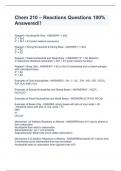
-
Chem 210 – Reactions Questions 100% Answered!!
- Exam (elaborations) • 6 pages • 2024
-
Available in package deal
-
- $10.99
- + learn more
Chem 210 – Reactions Questions 100% Answered!! Reagent = Nucleophile Only - ANSWER1° = Sn2 2° = Sn2 3° = Sn1 + E1 (polar medium necessary) Reagent = Strong Nucleophile & Strong Base - ANSWER1° = Sn2 2° = E2 3° = E2 Reagent = Weak Nucleophile and Weak Base - ANSWER1°/2° = No Reaction 3°/resonance stabilized carbocation = Sn1 + E1 (polar medium necessry Reagent = Base Only - ANSWER1° = E2 or Sn2 (if unhindered and no beta-hydrogen with unhindered base) 2° = E2 3° = E...

-
Organic Chemistry ACS Final Exam Study Questions and Answers with Complete Solution 2024
- Exam (elaborations) • 6 pages • 2024
-
Available in package deal
-
- $13.49
- + learn more
Basicity rules - -strong base: unstable/reactive (ED groups) -weak base: stable (EW groups/more EN/bigger) Chair conformation - -more stable equitorial (slanted) -pointing up/pointing down=cis if both up -elimination: trans and diaxial Newman projection - -gauche: substituent groups adjacent to eachother -grab middle and turn to put in plane Enantiomers - -not superimposable mirror images -same besides stereochemistry Diastereomers - -mirror images but one stereocenter stays and...
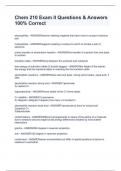
-
Chem 210 Exam II Questions & Answers 100% Correct
- Exam (elaborations) • 4 pages • 2024
-
Available in package deal
-
- $11.49
- + learn more
electrophiles - ANSWERelectron seeking reagents that have room to accept a electron pair nucleophiles - ANSWERreagents seeking a nucleus to which to donate a pair of electrons proton transfer or protonation reaction - ANSWERthe transfer of a proton from one base to another transition state - ANSWERlying between the products and reactants free energy of activation (delta G double dagger) - ANSWERthe height of the barrier, the energy that the reactants attain in reaching the the transi...
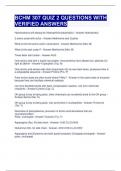
-
BCHM 307 QUIZ 2 QUESTIONS WITH VERIFIED ANSWERS
- Exam (elaborations) • 10 pages • 2024
-
Available in package deal
-
- $13.79
- + learn more
BCHM 307 QUIZ 2 QUESTIONS WITH VERIFIED ANSWERS Hydrocarbons will always be (Hydrophilic/hydrophobic) - Answer-Hydrophobic 2 amino acids with sulfur - Answer-Methionine and Cystine What is the first amino acid in all proteins - Answer-Methionine (Met, M) What is the start codon? - Answer-Methionine (Met, M) Three letter start codon - Answer-AUG Only amino acid with a fused ring system, most proteins have atleast one, absorbs UV light at 280nm - Answer-Tryptophan (Trp, N) Only...
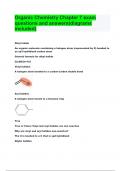
-
Organic Chemistry Chapter 7 exam questions and answers(diagrams included).
- Exam (elaborations) • 14 pages • 2024
-
- $14.99
- + learn more
General formula for alkyl halide C(n)H(2n+1)X Vinyl halides A halogen atom bonded to a carbon-carbon double bond Aryl halides A halogen atom boned to a benzene ring True True or False: Vinyl and aryl halides are non reactive Why are vinyl and aryl halides non-reactive? The X is bonded to a C that is sp2 hybridized Allylic halides Have X bonded to the carbon atom adjacent to a C-C double bond benzylic halides Have X bonded to the carbon atom adjacent to a benz...
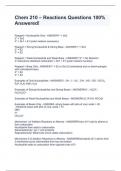
-
Chem 210 – Reactions Questions 100% Answered!
- Exam (elaborations) • 6 pages • 2024
- Available in package deal
-
- $13.99
- + learn more
Reagent = Nucleophile Only - ANSWER1° = Sn2 2° = Sn2 3° = Sn1 + E1 (polar medium necessary) Reagent = Strong Nucleophile & Strong Base - ANSWER1° = Sn2 2° = E2 3° = E2 Reagent = Weak Nucleophile and Weak Base - ANSWER1°/2° = No Reaction 3°/resonance stabilized carbocation = Sn1 + E1 (polar medium necessry Reagent = Base Only - ANSWER1° = E2 or Sn2 (if unhindered and no beta-hydrogen with unhindered base) 2° = E2 3° = E2 Examples of Only Nucleophiles - ANSWERCl⁻, ...
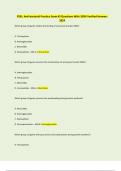
-
PS3L: Anti-bacterial Practice Exam #3 Questions With 100% Verified Answers 2024
- Exam (elaborations) • 4 pages • 2024
-
- $14.49
- + learn more
PS3L: Anti-bacterial Practice Exam #3 Questions With 100% Verified Answers 2024 Which group of agents inhibits the binding of aminoacyl transfer tRNA? A. Tetracyclines B. Aminoglycosides C. Macrolides D. Nucleophiles - ANS-A. Tetracyclines Which group of agents prevents the translocation of aminoacyl transfer tRNA? A. Aminoglycosides B. Tetracyclines C. Macrolides D. Lincosamides - ANS-C. Macrolides Which group of agents prevents the proofreading during protein synthesis? A. Macrol...
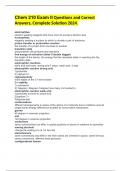
-
Chem 210 Exam II Questions and Correct Answers, Complete Solution 2024.
- Exam (elaborations) • 4 pages • 2024
-
Available in package deal
-
- $9.99
- + learn more
Chem 210 Exam II Questions and Correct Answers, Complete Solution 2024. electrophiles electron seeking reagents that have room to accept a electron pair nucleophiles reagents seeking a nucleus to which to donate a pair of electrons proton transfer or protonation reaction the transfer of a proton from one base to another transition state lying between the products and reactants free energy of activation (delta G double dagger) the height of the barrier, the energy that the reactants a...
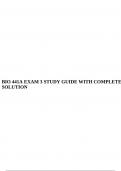
-
BIO 441A EXAM 3 STUDY GUIDE WITH COMPLETE SOLUTION.
- Exam (elaborations) • 20 pages • 2024
-
- $12.99
- + learn more
BIO 441A EXAM 3 STUDY GUIDE WITH COMPLETE SOLUTION. LECTURE ONE - METABOLISM INTRODUCTION ● Autotrophs synthesize all their own cellular constituents from simple molecules ● Heterotrophs obtain energy through oxidation of organic compounds and therefore rely on autotrophs ● Metabolism involves many reactions such as ○ Glycolysis/gluconeogenesis ○ The citric acid cycle ○ Oxidative phosphorylation ● Catabolism is the degradation of biomolecules ○ Energy rich nutrients are...
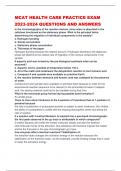
-
MCAT HEALTH CARE PRACTICE EXAM 2023-2024 QUESTIONS AND ANSWERS
- Exam (elaborations) • 50 pages • 2024
-
- $19.49
- + learn more
MCAT HEALTH CARE PRACTICE EXAM QUESTIONS AND ANSWERS In the chromatography of the reaction mixture, since water is absorbed in the cellulose functioned as the stationary phase. What is the principal factor determining the migration of individual components in the sample? a. Hydrogen bonding b. Solute concetration c. Stationary phase concetration d. Thickness of the paper Hydrogen bonding because the relative amount of hydrogen bonding to the stationary phase will determine the relative r...

That summary you just bought made someone very happy. Also get paid weekly? Sell your study resources on Stuvia! Discover all about earning on Stuvia


